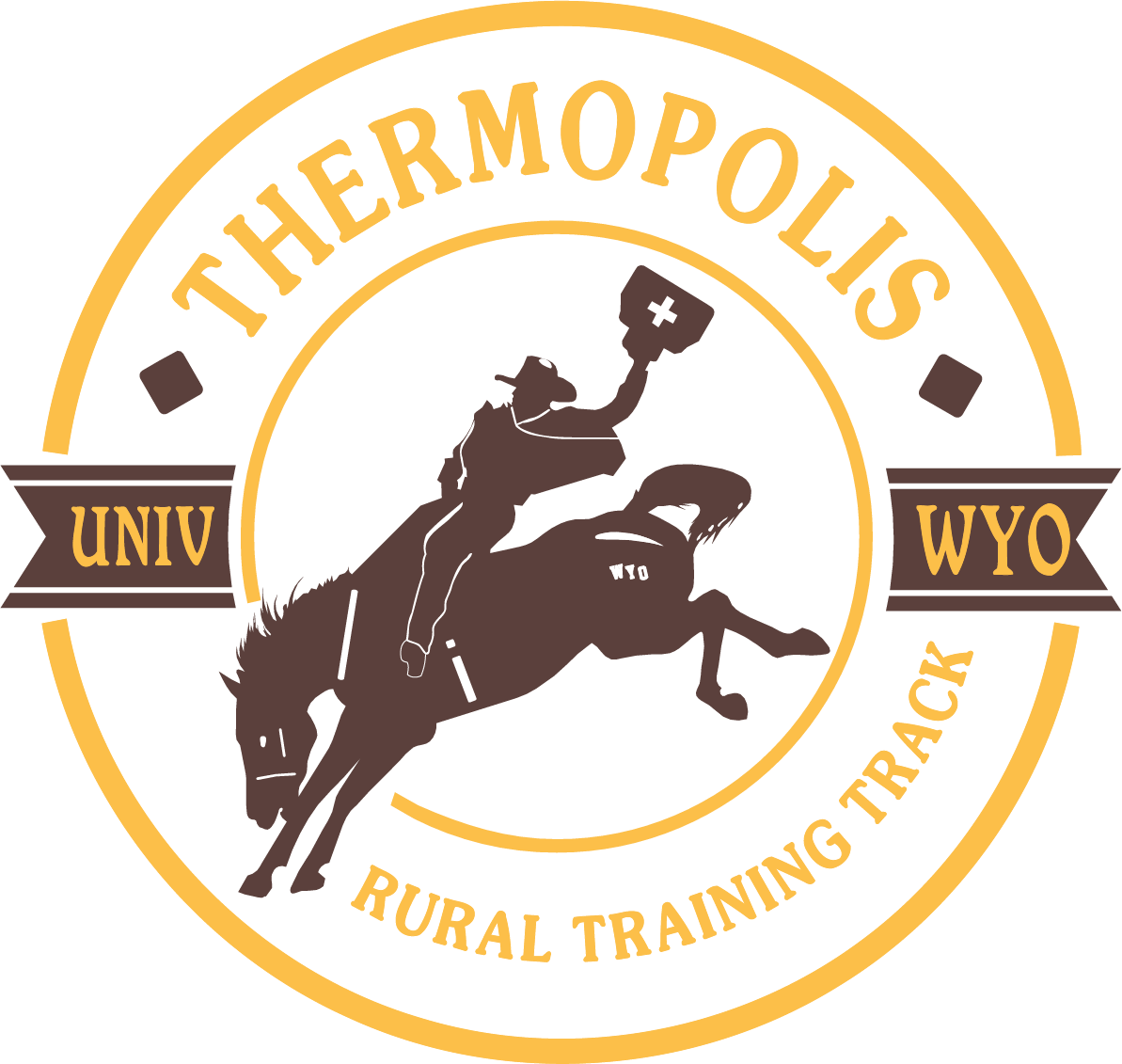The residents will spend a robust 1st year at the University of Wyoming Family Medicine Residency Program Casper with our core program. The intern year is set up with a traditional block rotation format to take advantage of the specialists and all that the Wyoming Medical Center has to offer. During that time, 1st year All PGY I residents spend one to two half days a week in their continuity clinic. Night call covered with float intern during the week & the weekend shifts covered in a rotating fashion by the remaining interns, depending on the rotation. One month is spent away from Casper for the pediatrics rotation in Salt Lake City. All first year residents are expected to pass ACLS, ATLS, ALSO, PALS, and NRP.
BEHAVIORAL MEDICINE 2 WEEKS
- The resident spends two weeks working with our behavioral medicine staff (psychiatrist, psychologist and social worker), and with other community providers at multiple facilities in the community. The goals of this rotation are to gain basic skills in diagnosis and assessment of mental illness, to improve patient interviewing skills, and gain knowledge of resources available in Casper for mental health care.
COMMUNITY MEDICINE 2 WEEKS
- Community Medicine consists of exposure to many of the ancillary services that are available in the hospital and community settings that aid in the delivery of comprehensive and quality care to patients. The following areas are included in the rotation: Physical and occupational therapy, Child Development Center services, rehabilitation services, and clinical laboratory services. The rotation will be in Thermopolis at the end of the intern year.
EMERGENCY MEDICINE 4 WEEKS
- While in the Emergency Department, the resident works directly with the ED physicians managing a variety of cases, including acute MIs, lacerations, asthma exacerbations, and a fortitude of trauma cases of various degrees (Wyoming Medical Center is a Level II trauma center with Life Flight service for most of the state).
FAMILY PRACTICE INPATIENT 10-12 WEEKS
- The family practice inpatient (FPI) service is a team composed of three interns who are supervised by a senior resident. At times, a PGY2 resident is also on the team. On this rotation, the residents are responsible for all hospital admissions of UWFP Clinic patients. The FPI residents are also on the Trauma and “Code Blue” teams. The intern maintains one to two continuity clinics per week.
INTERN FLOAT 4 WEEKS
- The night float rotation is designed to provide the intern resident with inpatient experience for a general family medicine service. The PGY2 float resident and PGY1 float resident function as a team to provide hospital coverage for all UWFPR patients and participate on emergency response teams for all patients in the hospital, including adult inpatients, pediatrics, and obstetrical patients.
OB/GYN 4 WEEKS
- During this rotation, the resident performs inpatient rounds with the OB-Gyn/Peds team. This is a combination of contraception care at Public Health and Casper College, outpatient gynecology clinic with community OB/Gyn and covering labor & delivery.
OB/PEDS 4 WEEKS
- On the OB-Gyn/Peds service, the OB and GYN residents work with the senior resident to provide care for obstetrical patients on the L&D and postpartum units, newborns in the nursery, patients with gynecological problems, and all box call and community FM doctors’ pediatric patients. In addition to the two half-days of one’s own clinic. The resident also has the opportunity to assist and perform C-sections, vacuum and forceps deliveries, D&Cs, and tubal ligations.
PEDIATRICS INPATIENT 4 WEEKS
- Located at Primary Children’s Hospital in Salt Lake City. The resident spends one month on the inpatient service as a member of the FM resident team. There is no clinic time. Housing is provided in Salt Lake City.
PRIMARY CARE PEDIATRICS 4 WEEKS
- This pediatric rotation is spent with one of the local pediatricians. The goal is to receive exposure and experience in primary care pediatrics.
ICU/CRITICAL CARE MEDICINE 4 WEEKS
- The resident works one on one with our critical care/pulmonology specialists. The resident gains experience in general ICU care, especially ventilator management. There are also pulmonology consults on the floors and a plethora of procedures including thoracenteses, chest tube placement, central lines, and intubations.
GENERAL SURGERY 4 WEEKS
- During this rotation, the resident works with one of the general surgeons in Casper. The resident will have the opportunity to participate in the surgical patient’s care from the pre-op setting to the OR (including first assisting), and finally to the post-op management. Call is taken with the surgeon.
Curriculum 2nd and 3rd year
Both of the below rotations will take place early in the second year
OBSTETRICS/GYNECOLOGY HIGH RISK- Spokane, WA
- This rotation takes place in Spokane, Washington, where the resident works in a high risk/high volume setting on the labor and delivery floor. Our residents work under the direct supervision of Family Practice faculty and OB Fellows.
PEDIATRIC ER 4 WEEKS- Denver, CO
- This rotation takes place in Denver, Colorado, where the resident works in a high volume Pediatric ER setting. Our resident will work under the direct supervision of Fellows and Pediatric Faculty.
Longitudinal Curriculum 22 months, Thermopolis, WY
The resident will live and train in Thermopolis during the remainder of the second and third year. We believe that the continuity of care is the center of what we do and the educational structure will emphasize this through the training process. Residents will see patients at the Hot Spring Health Clinic in Thermopolis, Hot Springs Health Hospital, and either the Worland or Riverton Clinic. Residents will spend 5-6 half days in their continuity clinic weekly. They will admit patients to the hospital, do ER shifts, and attend deliveries all during the course of a week. Additionally they will work with community and visiting attendings to gain experience in specialties such as Radiology, Surgery, Gynecology, Orthopedics, Cardiology, etc.
Hospital work will include daily rounds and will involve managing adult, pediatric, maternity, and neonatal patients.
Call shifts for the hospital and emergency department occur 1 night per week and one weekend per month, giving residents three Golden Weekends monthly.
The call shifts will be home call and include covering hospital patients as well as clinic patient phone calls.
EMERGENCY MEDICINE
- The longitudinal ER experience will mostly involve weekly call shifts, but will also include the resident’s involvement in any codes, MI’s, CVA’s, or traumas that occur during work hours if available.
The residents will take ACLS 1st and 3rd year and ATLS during the 2nd year. Residents should have the clinical and procedural skills needed to stabilize the emergency patient until appropriate medical, surgical, or pediatric treatment can be arranged; including transport if necessary.
BEHAVIORAL MEDICINE
- This rotation occurs during all three years and provides education in the integration of behavioral health and primary care. Upon completion of graduation we expect residents to be able to diagnose and manage uncomplicated mental health disorders. This experience is to further build upon skills to diagnosis and manage common mental health conditions in the primary care clinic and hospital. The experience will also help the resident further refine skills in visit structure/patient interaction through direct observation.
Residents will rotate with local counselors, psychologists, and psychiatric medical providers to further their knowledge in diagnosis of mental health conditions and complete psychiatric histories, gain skills in difficult patient interviews, and psychiatric medications.
. Routine opportunity will occur during patient visits in the continuity clinic as well as the emergency room.
FAMILY MEDICINE CLINIC
- Residents will spend a total of 5-6 half days in continuity clinic weekly, with one day per week at their continuity clinic in Worland or Riverton.
Residents will be providing continuity care to a larger number of families with a greater degree of responsibility during their 2nd and 3rd year. Residents are encouraged to coordinate all of the health needs of their patients with the assistance of team members.
GENERAL SURGERY
- Residents will consult local general surgeons regularly on hospitalized patients. They have the opportunity to join the surgeons for endoscopies and colonoscopies one morning each month. During the third year, residents will work with the surgeons in clinic to become proficient in the evaluation of surgical patients, as well as pre-operative and post-operative management.
INPATIENT MEDICINE
- The longitudinal inpatient experience will occur with daily teaching rounds at the hospital. Residents will run the inpatient service and develop proficiency in managing complex patients while becoming leaders of the inpatient care team and coordinating the inpatient care and the patients post hospital disposition.
MATERNAL/CHILD HEALTH
- The overall aim of this longitudinal curriculum is to build the base for progressing to the independent management of the following: prenatal, labor, delivery, and post-partum care; well and ill newborn care. This will occur with continuity clinic experiences as well as patient care in the hospital. Residents will have their own patient panel to follow longitudinally and will also be responsible for managing the other patients on labor and delivery. Additionally, the residents will get gynecology exposure with continuity clinic, working with visiting subspecialist, and working with the Family Planning Clinic. We have a high volume of high-risk OB and historically our residents graduate with more than 75 vaginal deliveries and more than 40 primary C-sections.
PEDIATRICS
- The high risk and higher volume pediatric experience will occur in the intern year and early in the second year with rotations at Denver Children’s and Primary Children’s in Salt Lake. Continued longitudinal experience will occur with the hospital, ER, and continuity clinic patients where they will see both acute problems and be involved in Wellness care.
GERIATRICS
- Residents will work with Geriatric patients longitudinally in the continuity clinics, hospital, and will also have their own patient panel at the local nursing homes. They will do nursing home rounds two times monthly with an attending as well as doinghome visits for selected patients.
ORTHOPEDICS
- Residents will work 1 full day a month with visiting Orthopedists. The residents will be involved in the preoperative and post-operative care of the patients. Focus will be working on acute and follow up fracture care, as well as proper splinting and casting techniques. Additionally they will work on POCUS training for joint injections and aspirations. Some Ortho procedural opportunities will also occur in the ER and continuity clinics.
SPORTS MEDICINE
- Residents will spend one evening a week during the school year visiting the training room at the local high school to see patients with an Attending and the Athletic Trainer. Working with acute injuries, planning rehab as well as return to play. Aspects of patient education and prevention will be incorporated in the experience.
RADIOLOGY
- Longitudinally, residents will work with a Radiologist who is in facility once a month. Residents will review films on hospital as well as ER patients. The focus or aim of this experience if for resident’s to become familiar with reading plain films and initial interpretation of CT examinations. They will also learn the appropriate modality and films to order in specific situations.
SUBSPECIALTY CLINICS
- Training in Ophthalmology, Dermatology, Cardiology, Oncology, ENT, Pain Management, and GI occur with visiting specialists in order to further residents skills in recognizing, managing, and coordinating primary care issues related to each of these fields.
OSTEOPATHIC MANIPULATION
-
One afternoon monthly is spent with DO faculty practicing OMM skills on patients in clinic.
Didactics
Thursday afternoons residents will have didactics covering all aspects of family medicine via ZOOM. One Thursday per month, the residents will travel to Casper for SIMS labs. Morning didactics occur 3-4 mornings weekly prior to multicisiplinary round and cover various outpatient, inpatient, ED, OB, and surgery topics. Didactics also include POCUS trainings and mock codes (trauma, cardiac arrest, difficult delivery, emergent C-section, neonatal resuscitation, any beyond).

